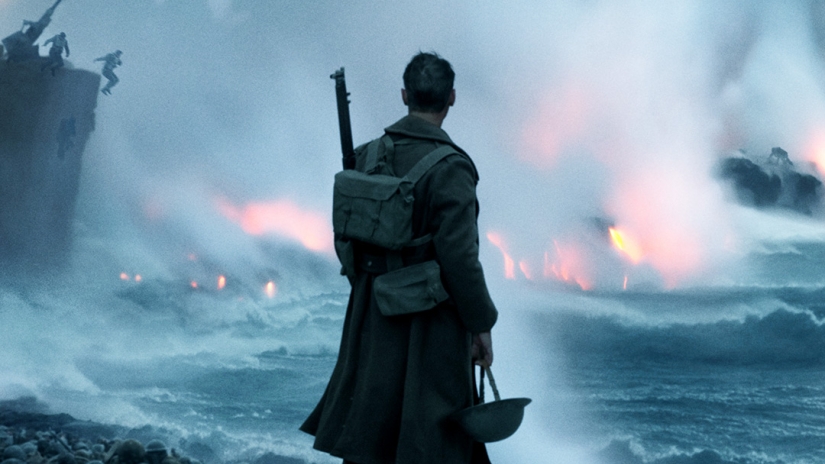There’s a moment early on in Christopher Nolan’s new film, Dunkirk, when Kenneth Branagh’s Commander Bolton mournfully looks out across the ocean from an under-siege jetty, and notes “you can practically see it from here”, he mutters, leaving a beat before adding “home”. It’s 1940, early in World War II, and the home in question sits on the other side of the English channel. 400,000 Allied troops are stranded the wrong side of it, as enemy forces – and planes – close in. It looks hopeless.
Thus, it’s a simple mission that faces Bolton and those under his command: they need to get their troops safely home, but the odds are mounting against them.
The narrative that Nolan’s film follows – based on true events, if that needed iterating – is that straightforward. Working from his own screenplay, his film is less a Saving Private Ryan-esque war movie, and more a very tense thriller with potentially savage consequences. In fact here, the stakes, the story and the thrust of the film are established incredibly quickly. You get barely 20 words of text on screen to set the scene (contrast that with the efficient but wordy text at the beginning of the excellent War For The Planet Of The Apes), and an opening prologue of sorts that sees Ffion Whitehead’s Tommy desperately darting through the streets of Dunkirk, picking up propaganda dropped from the sky that tells him the enemy troops are coming. Bullet sounds ricochet with chilling impact, and Tommy just about makes it to the beach. He, and everyone else, needs to get out.
As he makes it to the beach, so unfolds the sheer scale and magnitude of the situation, and as such, the film. As Nolan’s IMAX cameras take in the expanse of said beach, you can’t help but soak in just how desperate a situation everyone’s in. For in a summer riddled with effects-infested movies, Dunkirk proves once again that human beings trump computers. That initial beach shot – and you can’t help but draw a brief parallel with the visual accomplishment of Joe Wright’s Atonement – is simply staggering. It’s not flashy, it’s the sheer cinematic scale of it. Sands awash with human beings. Thousands of soldiers trapped. Then the film swiftly explains that there are only three ways out: the ‘Mole’, by sea, or by air. Each escape route is riddled with danger.
The final pieces of the jigsaw come from the other side. To the efforts of those trying to get to Dunkirk, heading into apparent certain death, to rescue the trapped soldiers. In particular, the film focuses on Tom Hardy and Jack Lowden’s fighter pilots careering across the sky, and Mark Rylance’s Mr Dawson, steering his small boat into dangerous waters. All the while, invisible clocks are ticking. Is there enough fuel in the planes to get to Dunkirk? How fast will the tide come in? How long before another enemy fighter comes into view?
It’s absolutely relentless drama, within minutes of the movie starting. It’s often noted how the film High Noon was transformed by the addition of shots of a clock in the edit. Nolan isn’t quite that overt, but he never lets Dunkirk lose momentum, deploying numerous techniques to keep the tension ramping up. He also draws Hans Zimmer’s best score in ages out of him, music that feels like it’s wired to the film like a heart monitor, constantly beating, without overtly signposting.
Just focusing on those enemy fighter planes for a minute, too. In Nolan’s hands, these are the most chilling threat I’ve seen on a cinema screen in a long time. The simple noise of an engine had me pretty much ripping the armrests off my seat, and the attacks and visceral impact of them back that up (an early sequence of bombs landing on the beach is incredible). The visuals throughout the film are unfussy, and the impact of them is enormous. On an IMAX screen, even more so. Not since Gravity has a film been so urgently needed to be watched on the biggest screen you can find.
But it’s the sound too. Nolan’s dialogue is sparse (eyes are often used to get across what 50 words couldn’t), his use of audio surgical, his deployment of silence when required pretty damn perfect. In his hands, one single bullet resonates far more than a big CG explosion, the slide of a lock enough to quicken the pulse faster than a dozen recent thrillers. It’s audio intimacy, in the midst of a massive summer film. Nolan also puts on screen an ensemble of uniformly excellent performances, with Tom Hardy, Mark Rylance and Ffion Whitehead amongst the many standouts. Even the One Direction fella isn’t bad.
Countering that, there are one or two moments where Nolan plays with chronology just a little (I appreciate that reads spoiler-y, but can assure you it isn’t), and that very, very slightly interrupts the tension build. But it’s such a minor quibble that it gets this little paragraph, and that’s that.
For it’s some achievement, this film. Very, very accessible (and that’s an important point), streamlined, economical and quite, quite brilliant, Dunkirk is – I don’t say this lightly – Christopher Nolan at the very top of his game. His best film? Maybe. There’s an argument for it at least. More certainly, it’s a relentless, engrossing, quite astounding piece of cinema (and cinema it very much is).
It’s also, hands down, the film of the summer. And whilst he’s not made it for such reasons, but I suspect Mr Nolan will need to practice his acceptance speeches for early next year. He’s made an utterly stunning, mesmerising film.

